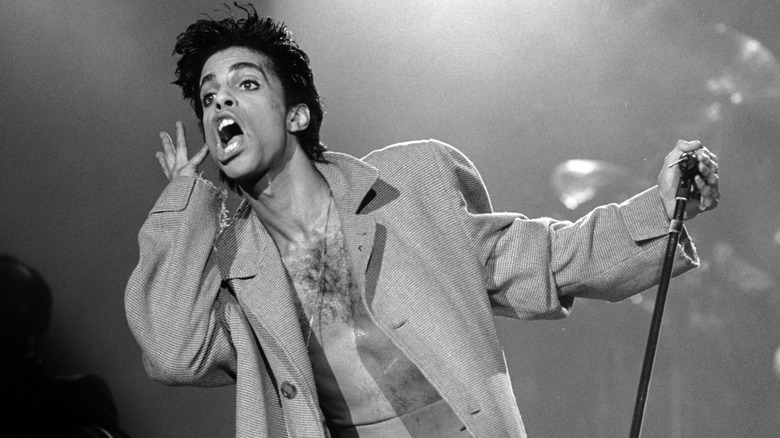Disturbing Details Discovered In Prince's Autopsy Report
Few artists, musical or otherwise, ever reach the status of "superstar." Fewer still are able to define a time as definitively as Prince defined the '80s and '90s when his music ruled the airwaves. Born Prince Rogers Nelson on June 7, 1958, in Minneapolis, Minnesota, Prince entered this world with music coursing through his blood.
His father, John Nelson, was a well-known jazz musician in the Minneapolis area (via All Music) who went by the stage name of Prince Rogers. His mother, Mattie Shaw, was a jazz singer who happened to sing in John Nelson's band (via Biography). Unsurprisingly, the young Prince was a bit of a wunderkind who taught himself how to play the guitar, drums, and the piano at a very early age. Despite childhood struggles with epilepsy, bullying, and an often contentious home environment (including his parents' separation), Prince found safety in his neighbors' home and comfort in music. By 1978, at the tender age of 20, Prince had signed his first record deal with Warner Bros Records.
AN ENTERTAINER IN PAIN
According to the StarTribune, Prince had been using medication to manage pain for years. In fact, Manuela Testolini, who was married to Prince from 2001 to 2005, told authorities investigating Prince's death that the musician had been "using narcotic pain pills during their marriage to manage pain." Sheila E., friend and fellow musician, also told Rolling Stone that Prince began suffering early on from hip pain. "He was in pain all the time, but he was a performer ... You think about all the years he was jumping off those risers."
By 2010, the hip pain became too excruciating for the entertainer to bear and he underwent hip replacement surgery to help alleviate his condition. To manage the pain caused by the surgery, Prince was prescribed Percocet (via StarTribune). And while it's difficult to ascertain what (if any) other prescription drugs Prince was taking at the time — mostly due to the performer's alleged use of personal assistants to obtain painkillers — it was clear to many associates and those employed by Prince that the singer was developing a problem.
An emergency landing
After playing two shows on the night of April 14, 2016, in Atlanta, Georgia, Prince (along with his new protégé and former participant in NBC's reality show, "The Voice," Judith Hill) boarded a private jet heading back to home to Minneapolis (via The Guardian). Longtime friend Kirk Johnson joined the pair on the flight back to Paisley Park. At 1:17 a.m. on Friday, April 15, the private jet made an emergency landing at the Quad City International Airport located in Moline, Illinois, according to The New York Times.
According to Judith Hill in The Times, she had been talking to Prince when he passed out. Both she and Johnson attempted to rouse the singer, but he was unresponsive. The flight crew took emergency measures, descending 45,000 feet in 17 minutes to land in Moline. According to Hill, paramedics arriving on the scene gave Prince a dose of Narcan (via ABC News) after confirming the singer had pills in his carry-on. Used in opioid drug overdoses, Narcan counters the effects of opioids (like fentanyl or heroin) by blocking the brain's receptors and reversing the overdose (via Family First Intervention). The shot worked and Prince was taken to Trinity Medical Center for further testing. Refusing the tests, however, the singer would later release a statement blaming the whole incident on a bad case of the flu (via Ultimate Prince).
no wrongful death charges
On April 21, 2016, Prince was found unconscious in his home, Paisley Park (via AP News). By the time medics had arrived, it was too late. Prince Nelson Rogers was declared dead at 10:07 a.m. In 2018, after an extensive investigation into his death, the toxicology report performed during Prince's autopsy revealed "exceedingly high" levels of fentanyl, a synthetic drug that can be 50 to 100 times more powerful than morphine (via Drug Abuse). According to investigators, the singer had levels of fentanyl in his liver as high as 450 micrograms per kilogram, per AP News. Experts point out that a mere 69 micrograms kilogram of fentanyl in the liver can prove fatal.
As for where Prince got the illegal fentanyl, it remains an open question. Early on, investigators zeroed in on Kirk Johnson. However, according to Mark Metz, the Carver County Attorney in charge of the investigation, investigators concluded that no one could be legally held responsible for the entertainer's death (via USA Today) for the simple fact that there was insufficient evidence to charge anyone with a crime.



